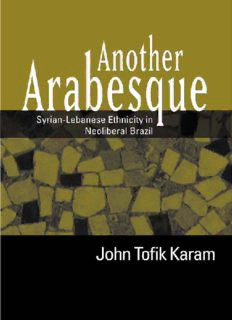
Another Arabesque: Syrian-Lebanese Ethnicity in Neoliberal Brazil PDF
Preview Another Arabesque: Syrian-Lebanese Ethnicity in Neoliberal Brazil
ANOTHER ARABESQUE A N O T H E R A R A B E S Q U E (cid:2) Syrian–Lebanese Ethnicity in Neoliberal Brazil (cid:2) J T K OHN OFIK ARAM TEMPLE UNIVERSITY PRESS Philadelphia Temple University Press 1601 North Broad Street Philadelphia PA 19122 www.temple.edu/tempress Copyright © 2007 by Temple University All rights reserved Published 2007 Printed in the United States ofAmerica The paper used in this publication meets the requirements ofthe American National Standard for Information Sciences— Permanence ofPaper for Printed Library Materials,ANSI Z39.48-1992 Library ofCongress Cataloging-in-Publication Data Karam,John Tofik. Another arabesque :Syrian–Lebanese ethnicity in neoliberal Brazil / John Tofik Karam. p. cm. Includes bibliographical references and index. ISBN 13:978-1-59213-539-4 ISBN 10:1-59213-539-0 (hardcover :alk.paper) ISBN 13:978-1-59213-540-0 ISBN 10:1-59213-540-4 (pbk.:alk.paper) 1. Lebanese—Ethnic identity—Brazil. 2. Syrians—Ethnic identity—Brazil. 3. Ethnicity—Economic aspects—Brazil. 4. Ethnicity—Social aspects—Brazil. 5. Brazil—Civilization—Arabic influences. I. Title. F2659.L42K37 2007 305.892'75692081—dc22 2006015346 2 4 6 8 9 7 5 3 1 (cid:2) To the memory ofmy grandmother,Tamar Ghosn Sfeir, meus olhos. To the memory ofmy grandfather,Tofik Sfeir, ya ‘aiuni. To my mother,Amelia Therese Karam, ya ruhi. To my father,Maron Joseph Karam, ya ‘albi. CONTENTS (cid:2) Acknowledgments • ix INTRODUCTION • The Politics of Privilege • 1 PART ONE Imagining Political Economy ONE • Pariahs to Partners in the Export Nation • 23 TWO • Eth(n)ics and Transparent State Reform • 46 PART TWO Remodeling the Nationalist Order THREE • Turcos in the Market Model of Racial Democracy • 71 FOUR • Mixing Christians,Cloning Muslims • 95 PART THREE Marketing Ethnic Culture FIVE • Ethnic Reappropriation in the Country Club Circuit • 121 SIX •Air Turbulence in Homeland Tourism • 144 viii CONTENTS CONCLUSION • In Secure Futures:Arabness, Neoliberalism,and Brazil • 166 Notes • 177 References • 195 Index • 209 ACKNOWLEDGMENTS (cid:2) W HILE VISITING LEBANESE RELATIVES in Rio de Janeiro in 1992, my brother and I accompanied our Brazilian-born cousin to a local arts-and-crafts fair.Among tourists and national artisans, my brother set his eyes on an elaborate bottle decorated with fake stones. With a client in his midst,the vendor declared,“Forty thousand cruzeiros.” Appalled at the inflated price, my cousin and I countered that it was not worth more than twenty.Lowering his initial offer by almost half,the dealer grew impatient as I demanded another descontinho(little discount).“Twenty or nothing,”I repeated.Tired of my haggling,the vendor met my demands but then commented to me,“You don’t have the face of a Brazilian.You’re turco[Turk]!”He proceeded to raise his clenched fist into the air to signify my tightfisted character, concluding, in a tone of defeat,“Pão duro! [fig., cheapskate].”Walking away from the successful transaction,we all laughed. Our cousin was afforded free entertainment. My brother acquired the uniquely decorated bottle. And, as a third-generation Lebanese American from upstate New York,I received my first lesson in being recognized as Arab in Brazil,at no further cost. Notwithstanding this penchant for bargaining associated with Arabs in Brazil, I have incurred innumerable debts in the almost fifteen years that havepassed since that exchange.To John Burdick,Arlene Dávila,Jeff Lesser, Karin Rosemblatt,Caroline Tauxe,and Hans Buechler,I am indebted for the countless number ofdetailed commentaries and critiques ofwhat began as a dissertation project at Syracuse University.I can only hope that this book is
Description: